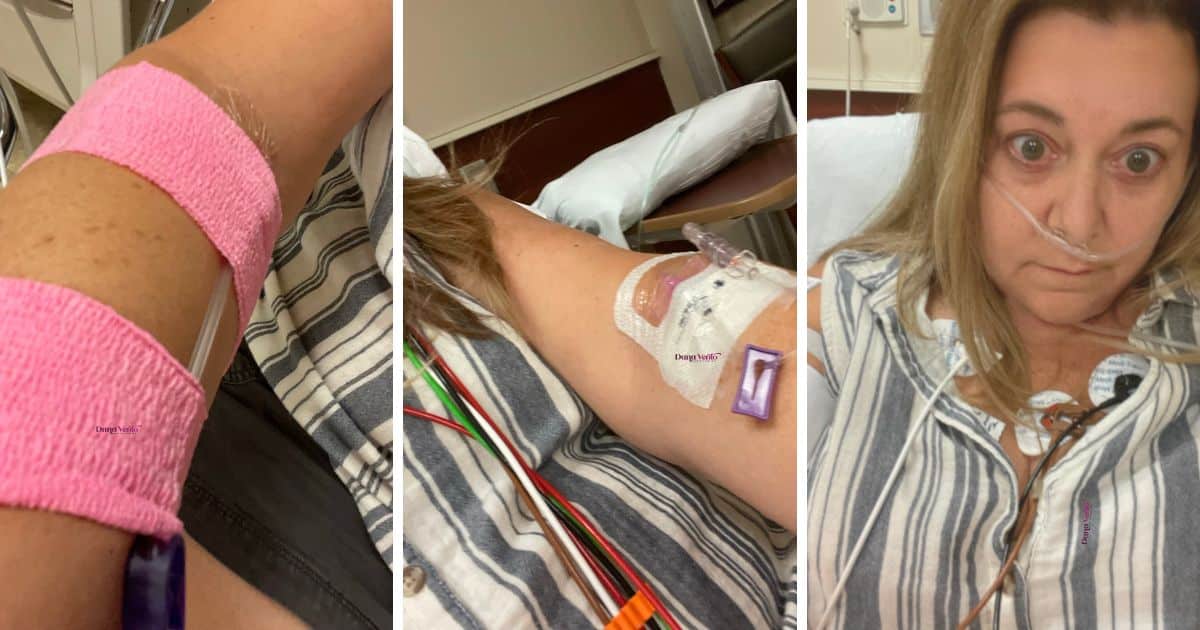The Unseen Danger: My Encounter with IV Contrast Anaphylaxis
Consider this: you’re about to undergo a routine CT scan. You’re in a hospital, a place of healing, surrounded by medical professionals. What could possibly go wrong? Yet, my story serves as a startling reminder that the routine can turn into a crisis in a heartbeat. Fasten your seatbelts as I narrate my nerve-wracking journey with IV Contrast Anaphylaxis, an unwelcome surprise during a standard CT scan procedure.

The Setup: Routine CT Scan with IV Contrast
In the world of diagnostic imaging, computed tomography (CT) scans play a vital role. These scans are often enhanced with the use of intravenous (IV) contrast, enabling clearer and more detailed images.
However, as with any medical procedure, there can be risks involved.
Today, I would like to share my harrowing personal experience with a ct scan with iv contrast that created an anaphylactic reaction even though I was premedicated. IV contrast-induced anaphylaxis is a severe, life-threatening allergic reaction.
Table of Contents
The Unexpected Turn: Onset of Anaphylaxis
It began with a routine medical procedure – a CT scan of my chest, abdomen, and pelvis. The contrast agent used for this procedure was Isovue 300, administered intravenously. Additionally, I took 500cc of diluted oral Gastrografin.

As a precautionary measure, given a previous allergic reaction to contrast during a similar test, I had been provided with a carefully timed regimen of 350mg prednisone tablets and two Benadryl to take ahead of the testing, starting 17 hours before receiving the contrast. The last time I had the test I had a reaction but not the anaphylactic reaction from IV Contrast that was about to onset.
Despite these precautions, the initial signs of an adverse reaction surfaced soon after the test. I found my tongue swelling and tingling, so I could barely talk.
The irony is that the radiologic technician told me before I injected it that the contrast has come a long way over the last 20 years (the last time I had it). It shouldn’t be a problem (bet me she never says that phrase again), and if anything should happen, I was in the best place because they have doctors and nurses and the ER room right in the next-door hospital.
When You Have An Anaphylactic Reaction From IV Contrast, And Your Tech Thinks Otherwise…
I was not very appreciative of the Radiologic technician, as her words were, “You were a bit apprehensive before the test; maybe that is why your tongue is swelling.” Hmm, glad to see she was putting her radiologic technology degree to use and playing nurse. Kudos that she summoned the RN in the other room to join us for what would start our adventure into an anaphylactic reaction.
The RN And The Fellow Radiologist Join The Anaphylactic Reaction From IV Contrast Party
The attending radiologist and nurse responded, offering an additional dose of Benadryl and some water, and then had me change my clothing back into street clothes (but left the IV in). Then, I was removed from the CT room so that other patient could access their appointments and moved into the RN’s office to be under his care and the Fellow Radiologist.

At this time, they began monitoring my blood pressure, which had alarmingly surged to 200/90, and running through my medical profile looking for more answers or other possible drug interactions, which there were not.
A Race Against Time: Emergency Response and Recovery
Minutes turned into what seemed like an eternity as my tongue refused to return to normal. Heavy, in the middle, and unable to speak except in slow, overly methodical words, my disgust and upset grew.
My blood pressure remained worryingly high, and there were discussions about moving me to the emergency room. There was a clash of the medical team, one believing I could be discharged and the other following strict protocol.
The Benadryl was not resolving the tongue lethargy (even 30 minutes after taking it), which was not a good sign, and the RN knew it.
The radiologist also sensed something was wrong and that my throat should swell from the CT Scan with IV Contrast, but the symptom was not happening, so she was willing to allow me to leave on my own recognizance, but what followed next was a blessing from above.
The RN Was Amazing
The RN called his charge nurse, reiterating his statement, “They are not equipped to maintain and stabilize beyond what he had done, and I needed to be moved to the ER.” He said his job was to stabilize and get me the help I needed which they were not equipped to do anymore; therefore, I needed the ER. (they both agreed on this, but the fact that my throat was not closing and my tongue had lightened up a bit truly looked like a great signal of a reaction clearing)
In addition, he put a very direct call to the prescribing oncologist to put them in the line of fire as well (which I very much appreciated, but the oncologist had not responded to him while I was there)
Conversely, the radiologist was more compelled to allow me to go home as each time she asked if my throat felt tight, the answer was no; it was just my tongue until it wasn’t.
The Almost Discharge And The Reaction The RN Knew Was Coming
Thus, the real nightmare began as we were on the verge of completing the discharge process. I felt an overwhelming sensation of being suffocated or drowning, and they had already asked me several times if my throat felt like it was closing, and it never had until right at that minute.
My legs flailed, and I told them I couldn’t breathe. The RN swiftly grabbed an epi-pen and called for a crash team, all at the same time, quite an expert marksman in his field. The CT Scan with IV contrast had created an anaphylactic reaction.
I had to force a swallow; I could not get my throat to swallow; it was as though I was underwater or being smothered; it was horrifying. This was the official anaphylactic reaction from IV contrast. The radiologist believes it should have happened but really took its time to surface.
My body was plunging into full anaphylactic shock due to the ct scan with iv contrast. What had started as a mild reaction quickly moved into a messy reaction!
A medical crash team was summoned, heart monitors were attached, an oxygen mask was applied, and an EpiPen was administered to restore my breathing amidst the flurry of activity. I didn’t even feel the injection.

I was removed from his office onto a gurney, and suddenly over a dozen medical personnel were around me. Due to this IV contrast anaphylaxis episode, security was beginning to clear a pathway for travel on the stretcher so that the medical team could quickly get me from building to building (and this was not a small journey)
From The Radiology Building To The ER Room: The CT Scan With IV Contrast Chaos
An adrenaline-filled gurney ride through the hospital corridors followed, with a confident, swift-moving, no-nonsense emergency team at my side and with security at every entrance to clear the way for this fast-paced journey from one hospital to another, with my breathing becoming labored again en route to the emergency room.
Upon arrival at the emergency room, a team of medical professionals sprang into action. I had additional IVs inserted (one would not go in, so I got the extra jab I really didn’t want or need), heart monitors replaced, and an oxygen monitor put on.

Since my airway passage in my throat was still struggling for air, I was given 150mg of a steroid to open up the airways.
Despite the whirlwind of interventions, the next two hours remained a rollercoaster of fluctuating blood pressure, heart rates, decreasing oxygen levels, and heightened emotions. Amidst this chaos, a chest X-ray revealed an unexpected complication – pneumonia.
A New Understanding: Reflecting on IV Contrast Anaphylaxis
With this episode behind me, I found something startling from one of the nurses: around 50% of people don’t respond positively to Benadryl.
For some, like me, it causes hyperactivity rather than sedation, rendering it ineffective. The nurse also mentioned that individuals with a history of adverse reactions to contrast should ideally avoid it, given the potential for more severe reactions in the future.
My oncologist should only take risks to treat cancer, not standardized testing, as the IV contrast can be withheld and yield fairly clear insight. The premedication was ineffective, and the decision to move forward was not the right call, in my opinion, which I will voice clearly.
The Takeaway: Knowledge is Power
What I want everyone to take away from my story is the critical importance of understanding the potential risks associated with medical procedures and the imperative to communicate any past adverse reactions or allergies to all healthcare providers. Like my near-fatal encounter with anaphylactic shock, the risk of a repeat reaction is a stark reality that must not be ignored.
- Benadryl is ineffective for me, I won’t use it again, nor will I accept a prescription.
- I will never allow IV contrast into my system again
- I will continue to advocate for myself and state my allergies and speak up when something is not right
- I will always share my medical stories when they can help someone else.
- I hope my story helps just one person avoid IV contrast anaphylaxis.
My tale is one of caution but also one of resilience and the tireless work of a medical team who fought to save my life. We must all be our own health advocates, arming ourselves with knowledge and insisting on informed safe care. ~ Dana XO
Medical Disclaimer:
Please note that the content provided in this blog post about CT scan with IV Contrast is intended for informational purposes only and is based on my personal experience. I am not a medical professional, and the information presented should not be used as a substitute for professional medical advice, diagnosis, or treatment of an anaphylactic reaction from IV contrast. Always seek the advice of your physician or other qualified health provider with any questions you may have regarding a medical condition. Never disregard professional medical advice or delay seeking it because of something you have read on this blog.


I really wish medical personnel wouldn’t be so quick to misdiagnosed. Especially with something like anaphylaxis because we know the difference and that makes things so much worse. I almost died over that very thing
I had my first reaction during an in-office procedure. The anesthesia they used were what caused it. They tried telling me I was having an asthma attack and 3 of them tried to hold me down. I felt like if I laid down I would die. By the grace of God, my mother appeared from the waiting room and called 911 herself. If it wasn’t for her I wouldn’t be here today. Clarified by the hospital ER. They don’t know everything and I feel some are quick to judge which can unfortunately cost someone their lives.
Thank you for sharing your experience. I’m so sorry to hear about the frightening ordeal you went through. It’s truly a reminder that we should always advocate for ourselves and trust our instincts when it comes to our health. I’m grateful that your mother was there to help, and I hope you’re doing well now. Wishing you good health and better experiences moving forward.